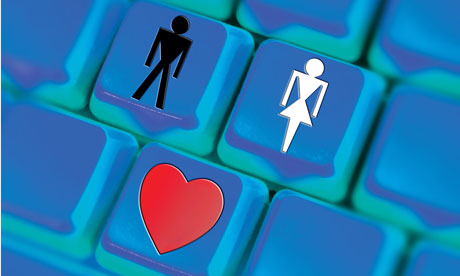
by John Walters
(U.K.) The internet is changing the way society communicates, processes information and knowledge, and configures its relationship towards authority. Some of these developments are exciting and challenging, but in one particular sense the internet poses a fundamental challenge to the way humans interact. The following criticism and concern regarding online dating is not at all intended as a criticism of good and heartening personal stories – I, too, know people who have met their significant other through online dating.
Today, internet dating has become more or less accepted as a way of forming relationships. There has been some criticism, but it has usually been of the functional and operational kind, regarding subscription costs or users providing false pictures or information. There has been little thought or comment on why matchmaking websites might be a bad thing per se.
Online matchmaking is premised on the notion of making rational choices. It is perhaps fitting that the language of economics and business has finally – in our late capitalist society – permeated the most irrational, the most human of all areas: the interpersonal. Internet dating is like shopping at LoveMart. We watch and read the adverts (people's profiles) and – based on what we are told is factually relevant data – we then, allegedly, make a rational decision to try the product. The more choices available (ie the more popular a matchmaking website), we are told, the better for those making the choice. Yet it is these intrusions by business speak into the very inner workings of society that should be of great concern.
This is further emphasised by the manner in which these processes are explained by proponents of online dating, as "opening up options" and "putting yourself out there". One site, Match.com, offers both efficiency ("Receive your compatible matches straight away") and informed choice ("Choose who you'd like to get in touch with"). The irrational and unpredictable nature of something very human – love and the interpersonal – is turned on its head and transformed into a rational product.
Furthermore, the way dating websites calculate matches distorts the very core of interpersonal relations. Online seekers of partners and friends rely on computer calculations of a set of hard questions. There is little room (if any) for subtlety, deviance, or exploration. The questions that many of these websites use are so mind-numbingly awful ("Are you happy with your life? A. Yes, B. No, C. Most of the time") that it cannot even be claimed to replicate real conversations. If I were asked most of the questions used to calculated compatibility on a normal date in a pub, say, I would run a mile. And that's the point: this is not an extension of humanity and human interaction; it is a fundamental shift. Interpersonal relationships are being transformed into products that can be (supposedly) objectively measured and objectively chosen, even though such relations represent the exact opposite.
In his book Éloge de l'amour (2009), Alain Badiou noted two slogans for two online dating websites. The first claims that one can have love without the unexpected ("Ayez l'amour sans le hasard!"). The second promises that one can be in love without falling in love ("On peut être amoureux sans tomber amoureux!"). Love – this great irrational driver of humanity – has become an object, which people wish to be fully informed about, choose rationally, and not suffer any unexpected disappointments from. It is, as philosopher Slavoj Zizek has noted, like caffeine-free coffee.
We want to enjoy these essence-free products, but without the irrationality of consuming bad things or accepting the spontaneous and unpredictable nature of emotions and feelings. Everything that makes culture and society real, impulsive, and often erratic is stripped away in favour of rational choice-making. We don't want to harm ourselves; we don't want suffering; we don't want hardship; we don't accept difficulty and disappointment. We simply want (and demand) the 100% consumer fulfillment of obtaining products based on rationality. This criticism can be extended of course to other forms of online communities, such as Facebook, where contact-less friendships are reduced to pokes, LOLs, and vacuous innuendos.
Some critics, such as Badiou, have suggested that online dating is taking society back to a pre-modern version of arranged marriages. I would say it is worse. Society has invited the language and practice of market rationality into its midst. It has taken over not merely communal aspects of society, but the very essence of what it means to be human.
No comments:
Post a Comment